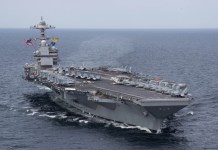If history is any indication, then the Chinese concerns over what a Biden Presidency in the United States will impact their country are more serious than what appears to be the case with the Indians.
Afghanistan, The Graveyards Of Super Powers – Will China Be Next In The Firing-Line?
And it is not because of the apparent bipartisan consensus between the Democrats and the Republicans on befriending India and “containing” China.
Chinese are worried that given the virtual division of the USA into two conflicting camps between the Republican and Democratic supporters, as evident in the just held Presidential elections, Joe Biden will be a “weak President” and thus more susceptible to pressures to adopt a more “hostile” policy towards Beijing, which, in turn, could lead to military interventions.
Strange it may seem, but the fact remains that a bigger number of the major military interventions of the United States in various parts of the world has occurred under Democratic regimes, not Republican ones.
According to Professor Zheng Yongnian, the Dean of the Advanced Institute of Global and Contemporary China Studies, a Shenzhen-based think tank, and a foreign policy advisor of Chinese President Xi Jinping, President-elect Joe Biden might take advantage of the public resentment towards China after he enters the White House.
“American society is torn apart. I don’t think Biden can do anything about it. He is certainly a very weak President, if he can’t sort out domestic issues, then he will do something on the diplomatic front, do something against China. If we say Trump is not interested in promoting democracy and freedom, Biden is. Trump is not interested in war… but a Democratic President could start wars.”

Prof. Zheng is well aware of a fundamental lesson in international relations that outside interventions in general and wars in particular play a very important role for the leader of a country, who is otherwise weak politically, in garnering the domestic support behind him and pacifying the public resentment. “He (Biden) is likely to turn the advantage of public resentment against China,” so runs Professor’s argument.
The history of the United States over the last 100 years does vindicate Zheng’s thesis. Democratic Presidents often promise domestic largesse and moral uplift, but many of them do end up taking their country to war.
It was under Democratic President Woodrow Wilson that the USA entered World War I. Wilson has been described as a dangerous interventionist in Latin America too. He sent troops to Haiti, Nicaragua, the Dominican Republic, and Mexico – and all these interventions were in the name of “furthering democracy”.
And again it was a Democratic President Franklin Roosevelt who joined World War II, even though Republicans were against the move. Of course, the Japanese attack on Pearl Harbour in 1941 facilitated his task. But his critics were not at all in favor of the United States extending the American role into the continent of Europe. Nor for that matter his joining hands with the Russians in what was said “selling out the East European countries”.
Roosevelt’s successor Harry Truman, another Democrat, went even to the extent of fighting against Communist China in Korea in the 1950s. His was an impulsive response to a cross-border attack that re-shaped American foreign policy and intensified the then Cold War. His support for the “containment strategy” proposed by American diplomat George Kennan and his failure to rein in General Douglas MacArthur’s push to the Yalu River triggered a Chinese intervention.
The Truman Doctrine and its declaration that it was the “policy of the United States to support free people who are resisting attempted subjugation by armed minorities or by outside pressures” paved the way for what became the limitless definition of US national interests that unfolded over the next 60 years. Indeed, historians argue that few Presidents used the foreign policy as a political punching bag as frequently as Truman.
President Lyndon Baines Johnson, another Democrat, made things worse for not only the US but for the whole world by his mishandling of the Vietnam War. He derided principled opposition to the war in his country as “unpatriotic” (in 1966 he called anti-war advocates “Nervous Nellies”) and escalated the conflict surreptitiously, without fully informing the American people. So much so that the credibility gap he created during the Vietnam-War went a long way toward undermining the confidence of the American people in their elected leaders. It was not surprising that he hopelessly divided the Democratic Party and could not be re-elected in 1968. In fact, it was he who ensured Republican Richard Nixon’s victory in November 1968.
The two World Wars, the Korean War, the Vietnam War and the Cold War in general were all epoch-making in the history of mankind. And in all these global developments, Democrat Presidents of the United States played major roles.
Now that the world is supposed amid another Cold War – this time between China and the United States – will not another Democrat President Biden intensify it?




